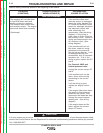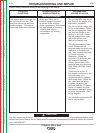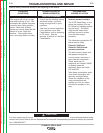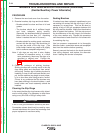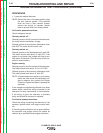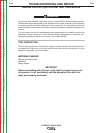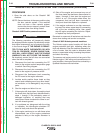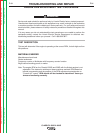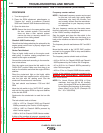
ENGINE ALTERNATOR TEST PROCEDURE (continued)
PROCEDURE
1. Locate the engine alternator.
NOTE: Secure the door in the open position using
the door restraint system. If the machine
does not have a door restraint system,
remove the door(s) or securely restrain
them to prevent them from falling closed.
For Perkins powered machines:
Check voltage as follows:
Run/stop switch off:
Chassis ground to the B+ terminal of the alternator,
the meter should read battery voltage.
Chassis ground to the alternator flash/sense lead,
lead #59. The meter should read 0 volts.
Run/stop switch on:
Chassis ground to the flash/sense lead, lead #59.
The meter should read about 12 Volts DC. If the
engine is not started, this voltage will drop to zero
after about 30 seconds. (This time may be 60 sec-
onds on some models.)
Engine running:
Chassis ground to the B+ terminal of the alternator.
The meter should read about 13.5 to 14.2 VDC.
Chassis ground to the alternator flash/sense lead.
The meter should read about 10 Volts DC.
NOTE: A closed temperature switch or oil pressure
switch can also cause the flash/sense volt-
age to measure low; perform the Engine
Protection System test before replacing the
alternator.
If the voltages are significantly different from those
shown above, check the wiring connected to the
alternator for faulty connections or bad insulation.
If the wiring is good, the alternator is probably
faulty and should be serviced or replaced.
For Kubota powered machines:
Check the wiring connecting the alternator to the
ammeter, ignition switch, and engine control mod-
ule.
If the wiring and connections are in good condition,
the alternator and engine control unit should be
checked by a qualified Kubota engine technician.
TROUBLESHOOTING AND REPAIR
F-26 F-26
CLASSIC® 300D & 300G
Return to Section TOC Return to Section TOC Return to Section TOC Return to Section TOC
Return to Master TOC Return to Master TOC Return to Master TOC Return to Master TOC



